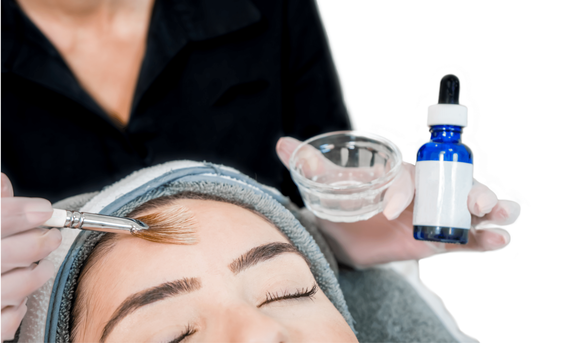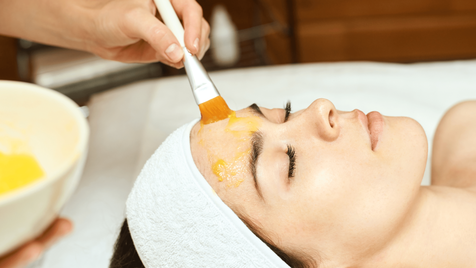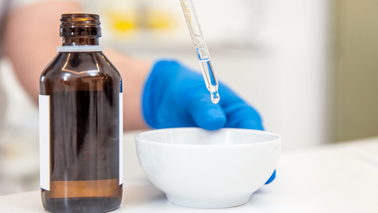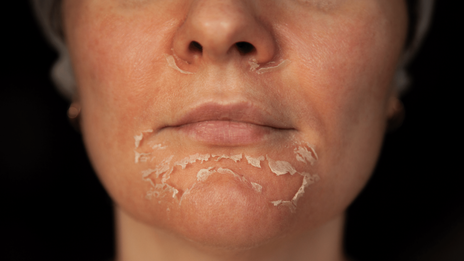Looking For A Chemical Peel Near Me?

The surface layer of our skin is prone to all types of hazards: sun damage, discoloration, pollutants, wrinkles, acne, and even acne scarring. The way we look on the outside affects how we feel on the inside. Chemical peels are a great way to address these issues and more. If you’ve been thinking about getting a skin peel and even Googled “chemical peel near me,” you’ve come to the right place.
What is a chemical peel?
Our skin has three main layers: the outermost epidermis, the dermis, and the deeper subcutaneous layer. The epidermis is constantly renewing itself, providing a fresh layer of skin every 28 days or so. However, this skin turnover grinds to a crawl with age. The result is dull skin, wrinkles, and a host of other skin concerns.
Chemical peels help slough off the top layer of skin by applying a chemical solution made of alpha and beta-hydroxy acids. Your dermatologist or esthetician will use a cotton swab, sponge, or brush to apply the chemical gently to your face. You’ll feel a slight tingling sensation or a more intense feeling based on the type of peel.
Chemical peels have been around for hundreds of years and took a bit of a hiatus with laser therapies’ popularity. Now, they are making a comeback. More and more people see them as an effective way to treat their skincare problems.
Types of peels
Based on your skin type and current skin concerns, your dermatologist will decide on the correct type of chemical peel. Some peels target each layer of your skin, using different acids to provide you with the results you need.
1. Superficial peels
Most chemical peels treat the epidermal layer and are called light peels or superficial peels. Superficial peels are excellent for sun damage, dull skin and discoloration. These peels can also tackle acne, rosacea and enlarged pores.
These surface peels use mainly alpha hydroxy acids (AHAs) like glycolic acid, mandelic acid, citric, and lactic acids. AHAs are great for stimulating collagen, so you get fantastic anti-aging benefits. Your dermatologist may use salicylic acid, a lipid-soluble beta-hydroxy acid (BHA) that is able to penetrate deep into the oil glands. These peels can happen during your lunch hour and require little downtime.
There is also the Jessner’s peel- it combines salicylic acid, lactic acid, and sometimes resorcinol. Jessner’s peels are great for evening skin tone, reducing the appearance of scars and smoothing out wrinkles.
2. Medium peels
Medium peels go a bit further, affecting the dermis. Your dermatologist may use Trichloroacetic (TCA) acid and glycolic acid to complete these medium peels. TCA peels are great for more deep-rooted wrinkles and sunspots. Some dermatologists also use retinoic acid, which is perfect for acne as it’s much more potent than over-the-counter retinoids.
Both TCA and retinoic acid are flexible in their application. Sometimes, superficial and medium depth peels may be combined to increase their effectiveness. Medium peels require similar steps as surface peels but will feel more intense during the application. Unlike light peels, there will be a few days of downtime as the skin peels off.
3. Deep peels
For serious, deep-seated skin concerns, a deep skin peel may be best. Some of us have severe acne scars, deep wrinkles, or uneven skin tone. Deep peels even treat some precancerous skin conditions. These peels are known to bring about significant improvement in just one session.
Deep peels should not be used by just anyone and can cause damage if misused. A board-certified dermatologist who is also a chemical peel expert, will understand the nuances of your skin and provide the right solution.
A typical deep peel is a phenol peel, known for treating long-term deep wrinkles and scars. Phenol peels take longer to perform than other peels and require ongoing care after the procedure. The recovery time is one of the longest of any dermatological procedure. Your dermatologist may also use croton oil with phenol to enhance the effectiveness of the peel. However, this combination can be painful and requires anesthesia.

Pros and Cons of skin peels
If you’re thinking about chemical peels, you’re on the right track. Chemical peels have major upsides, making them beneficial in lots of ways:
- Superficial chemical peels are a cost-effective way to treat even deep-seated skin problems when compared with laser therapy.
- It’s a simple, non-invasive procedure that can treat issues in a short amount of time—no need for complex surgical procedures.
- There is little downtime with superficial and medium peels. With the proper aftercare – based on your dermatologist’s recommendations – you can go about your day almost immediately.
- Chemical peels have a high ROI (return on investment). You can treat multiple skin issues with one treatment.
- Deeper peels can reduce wrinkles and fine lines for months on end. It can make your skin feel smooth and refreshed compared to over-the-counter solutions.
While there are many pros, there are a few cons to look out for as well:
- Deeper skin peels have more downtime and may take longer to heal despite the results.
- Swelling, redness, and other unwanted side effects can happen.
- Chemical peel may cause burns and scarring if not applied correctly. Although these cases are rare, most happen to people trying at-home chemical peels. It’s best to visit a board-certified dermatologist to reduce the chances of this happening.
- There is a common misconception that people with darker skin should avoid chemical peels. If the applicator has little experience treating dark skin, chemical peels can cause more hyperpigmentation (dark spots) and scarring. Make sure your dermatologist has experience with different skin types and ethnicities and can walk you through the process successfully.
Who is a good candidate for chemical peels?
Skin peels are all about choosing the right solution for your skin. To figure out if a chemical peel is right for you, speak with a board-certified dermatologist first. Your dermatologist will do a complete skin evaluation to determine the type of chemical peel for you. Furthermore, you may have to perform some preliminary skin treatments at home to prepare you for your peel.
People who are great candidates for chemical peels include:
- Those who are in generally good health with no known allergies to the ingredients in skin peels.
- Anyone with a history of dark spots, uneven skin tone, fine lines, and acne.
- Those who want a non-surgical way to transform the look and feel of their skin.
- Those who tried acne medication over the last year without success. A superficial chemical peel may help..
If you are nursing or pregnant, you should not try chemical peels. It’s unsure how the procedure will affect you or your child. If you’ve taken Accutane (or isotretinoin) over the last six months, you may need to wait a while before getting a chemical peels.

Have it your way: Customized Facial Peels
Chemical peels often come in standard combinations to treat general skin issues. But the great thing about chemical peels is that a dermatologist can customize them to each individual’s needs. However, making custom solutions, known as compounding, can be challenging. Some combinations may be too harsh for your skin, while others may not get the job done.
At Eternal Dermatology, our lead dermatologist, Ife Rodney, MD, is considered one of the country’s top chemical peel specialists. She understands how each acid works with your skin and designs a peel specifically for you.
For instance, we can use a 10% or higher concentration of salicylic acid to tackle acne that’s been plaguing your skin. Salicylic acid is known for its anti-inflammatory qualities, making it great for acne. Or we may modify a Jessner’s peel based on a long-term skin condition like melasma.
Why choose customized chemical peels?
Compounding has some amazing advantages. For starters, it’s natural to feel uneasy when deciding on a chemical peel. But something is reassuring about your dermatologist creating a solution that’s specific to your skin.
Compounding also brings superior results since your dermatologist can combine only the best acids for your skin concerns.
Your dermatologist will know what works and what doesn’t, improving the safety of the procedure. This experience gives your doctor more control, allowing them to help based on skin color and current skin issues.
Feel free to reach out to us for a consultation. At Eternal Dermatology, once we first get a clear understanding of your concerns, then we can customize a chemical peel solution that will bring you the results you’ve been looking for.
Common concerns about chemical peels

Are skin peels safe?
Any medical procedure, surgical or non-surgical, carries some degree of risk. The deeper the peel, the greater the chances of an unwanted side effect. Common side effects include redness, swelling, and even scarring. That said, chemical peels are one of the safest and most effective procedures in dermatology.
These risks decline significantly with a dermatologist at the wheel. Your dermatologist understands how each acid impacts your skin’s and how long the peel should stay on. Once you follow the aftercare instructions, you’ll get the best results with little to no downtime.
Do chemical peels thin your skin?
A common misconception is that excess chemical peels can thin make your skin feel papery thin. Chemical peels do the opposite. They resurface the skin and even improves the production of collagen. More collagen means firmer, plumper, more youthful skin.
Why does my skin look worse after a chemical peel?
After a chemical peel, the skin can look a little worse, and that’s actually a good thing. Your chemical peel has broken up the excess oil, dirt, and dead skin that’s been hanging around for far too long. This unwanted debris comes to the surface, bringing some extra redness and inflammation. After a few days, the skin begins to flake off, purging itself from these impurities. Using the right moisturizer and sunscreen keeps your skin safe while the chemical peel does its thing. With this in mind, make sure to plan your chemical peels well in advance before your big event!
How many chemical peels do you need to see results?
When the right peel is used, you can start seeing results in as soon as after just one peel. Based on the issue you’re tackling, like sun damage or acne scars, you may need multiple light peels to see the best results.
These treatments happen in three to four-week intervals as many as three to four times. Your dermatologist will guide you on the full procedure timeline and what you’ll need to do between visits.
How long do chemical peel results last?
How long you’ll experience the benefits of your peel is dependent on two factors. First, the type of peel plays a significant factor in how long it will last. Surface peels tend to last up to six months. between one to two months. Medium peels last a bit longer, and deep peels may last for several years at a time.
Secondly, chemical peels last longer once you establish a proper skincare routine between peels. Make sure to use sunscreen with an SPF of at least 30 and a moisturizer. Avoid excess sun exposure since your skin will be more sensitive during this time.
Book a chemical peel consultation today
If you’ve looked up a “chemical peel near me,” you’re looking to take some action on a skin condition that’s affected you for some time. Everyone deserves smooth, clear skin that fills them with confidence—having clear, consistent skin can improve almost all aspects of your life.
At Eternal Dermatology, we understand that your skin deals with challenges every day and needs to find a way to reset. With a customized chemical peel regimen, you can finally say goodbye to the dull skin that’s no longer serving a purpose. We’re conveniently located in Fulton, MD, and serve Columbia, Silver Springs, Howard County, Baltimore, and surrounding areas.
There are a few ways you can connect with us:
- Book an appointment directly on our website.
- You can also request a consultation by clicking the link at the bottom of our homepage.
- Call or email us via our Contact Page.
Our board-certified dermatologist, Dr. Ife Rodney MD, FAAD can create the right chemical solution for all skin types and concerns, giving you the results you crave.
